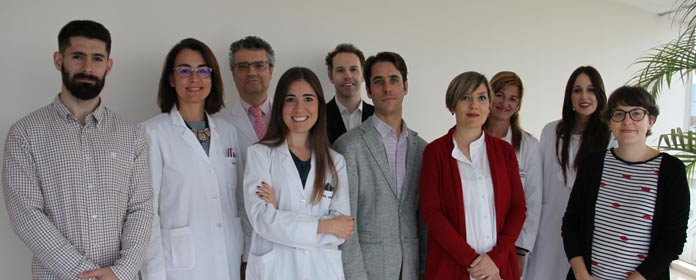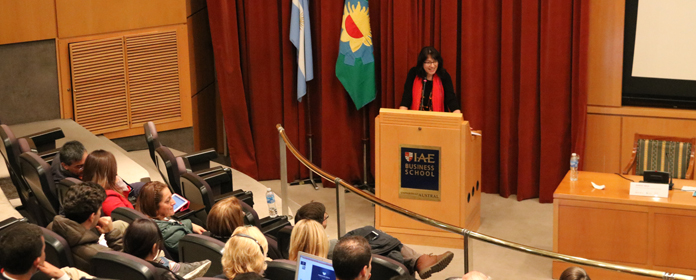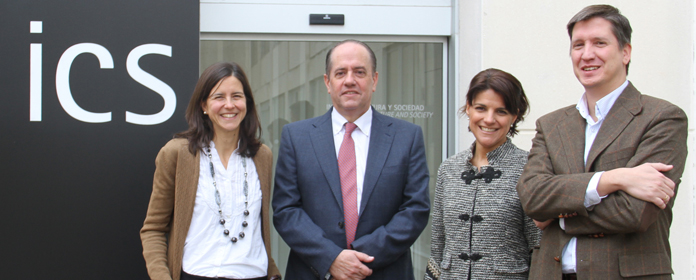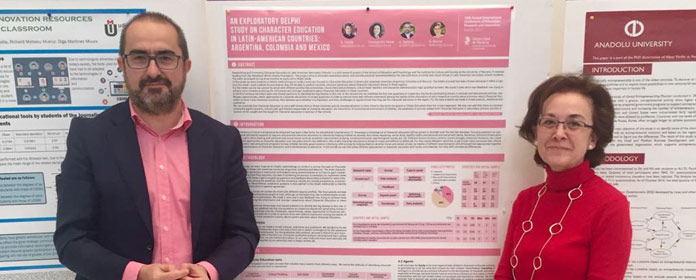"The Education of character combats inequality, as it prepares to face the problems of life."
Mariana Zúñiga, from the high school Nacional para la assessment of the Education, participates in a University workshop held at the Universidad Panamericana.
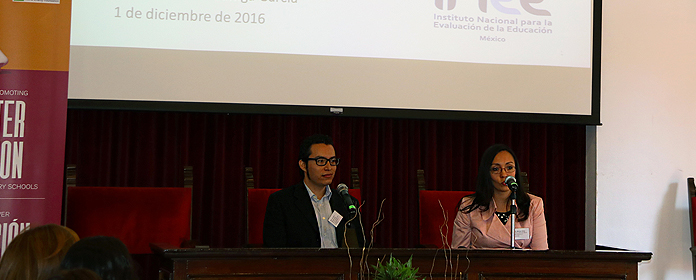
Mariana Zúñiga, from the high school Nacional para la assessment of the Education (Mexico), participated in an activity of the University of Navarra (Spain) held at the Universidad Panamericana (Campus Mexico). She presented the discussion paper 'Visión, legislación y internship educativa en México', in which she showed the progress of the Plan Nacional para la assessment de los Aprendizajes (Planea), which evaluates students in sixth grade and third year of secondary school.
Zúñiga was one of 25 experts from Mexico, Colombia and Argentina who attended the workshop of the project 'Investigar y promote la Education del carácter en escuelas de secundaria de Latinoamérica', a joint initiative of the Institute for Culture and Society and the School of Education and Psychology of the University of Navarra, with funding from the Templeton World Charity Foundation.
What is the importance of the Education of character (or Education moral) in the teaching secondary?
The Education of character or socioemotional skills are important in themselves, but they are also necessary to maintain an environment of cordiality and healthy coexistence. Their scope is not only school and basic Education , but also raises the acquisition of learning for adult life, family and work. In short, we can say that they are fundamental for the development and well-being of people.
How can Education of character or social-emotional skills help to avoid inequalities among adolescents?
Students acquiring social-emotional skills will possibly help to decrease the achievement gaps between the haves and have-nots, but it is not the solution to all the problems of inequality and inequity in the National System educational . The Education of character or social-emotional skills will have an indirect impact on combating inequality and inequity because it prepares people to face and cope with life's problems, be they economic or family, to name a few.
Currently, these skills are being given an important weight because they are considered essential for life and pieces core topic to acquire other learning. In Mexico, the National Plan for the assessment of Learning (Planea) not only contemplates measuring the level of performance and the school context, but is also beginning to evaluate the socioemotional skills of students.
What to consider when assessing social-emotional skills and inequality?
When we talk about inequality, we are talking about the need to address the diversity of conditions and needs of students, teachers and schools throughout the country. An important part of improving the distribution of resources is to have relevant information that accounts for the state educational of schools, which is why national learning assessments are an essential tool .
In addition, the Education character or social-emotional skills are closely linked to the right to learn and to the quality of the Education. This right means that schools must adapt to the specific conditions of their school population, students must feel safe, respected, accepted by the school and what they are taught must coincide with their interests, but above all, it must be useful for their lives. If these conditions are not met, it will be difficult for students to improve their socioemotional skills.
What is the current state of Mexican schools in terms of inequalities and achievement?
Inequalities in achievement educational are assessed through the size of gaps at different levels and between groups. Inequalities have been measured over the last ten years with the 2005, 2008 and 2012 Spanish ( language castellana) achievement level gaps presented by high school students in the Exámenes de Calidad del Logro educational (EXCALE). The results of the three aforementioned evaluations showed that telesecundarias, characterized by being located in rural areas and often lacking the necessary infrastructure, are the ones with the largest gap with private schools.

Another way of analyzing inequality in achievement educational is through the percentages of students who are located in four performance levels (N1, N2, N3, N4). These levels are cumulative, i.e., those students who have acquired the learning of a given level have, in the same way, those of the previous level. As an illustration, the Planea 2015 primary school results show that indigenous schools have 80% of their students at achievement level one, which is the lowest, while private schools have 13.3% of their students at this level. This indicates that the majority of students in indigenous schools will have serious difficulties throughout their school career. Thanks to these results, it is possible to get a general idea of the future trend of student achievement educational .

What are the challenges of this aspect of Education in fostering scholastic achievement?
The first challenge is to measure Education character and its components accurately and adequately. As it is a broad term with different definitions, delimiting the dimensions that compose it and conceptualizing it is a complex task.
The second challenge would be to make inferences about its impact on the level of school achievement of students in various contexts. We are not starting from zero, there is already some evidence, for example, the results of the Third Regional Comparative and Explanatory Study, conducted by OREAL and UNESCO in 2015, showed that the perception of violence in the surroundings of Mexican schools is negatively related to the level of student achievement. This evidence makes us think that the school environment and socioemotional skills within the school must have a profound impact on the level of achievement. However, a measurement focused on social-emotional skills and not on environmental violence is necessary to have a more accurate data.
The third challenge would be to make an in-depth analysis and use the results of the evaluations. The information obtained by relating the level of performance and socioemotional skills would be a milestone to dimension the possible inequalities and inequities of the System educational, which would also help to answer questions such as: Is there any vulnerable group that due to their socioeconomic conditions present lower levels in their socioemotional skills and this affects their level of school performance? Answering these questions will help to build a general panorama of the status of students' skills in the country. Possibly the most difficult thing to achieve is to be able to use the information to develop strategies and interventions to improve Education.

